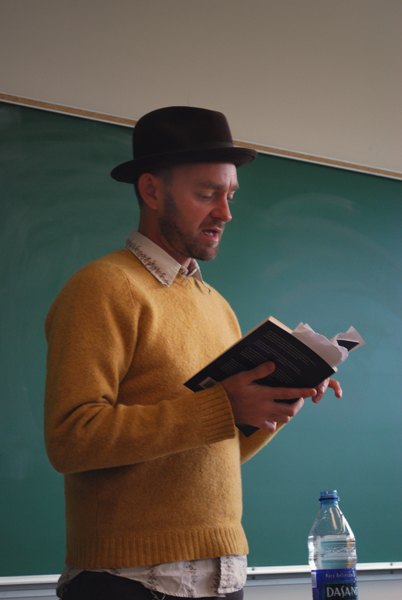Kwantlen prepared for new trans fat rules
October 4, 2009 by Kirk Darbyshire · Leave a Comment
British Columbia’s new trans fat regulations, the first of their kind in Canada, went into affect Sept. 30. The new restrictions promise to reduce people’s risk of exposure to industrially produced trans fat in situations where they have limited ability to know what’s in their food.
These new regulations may greatly change the way many eating establishments around the province do business, but not here at Kwantlen. “It’s been campus policy for a long time now,†said Belinda Kaplan, Director of Food Services for the Surrey campus. “We switched our products over well before the regulations came into affect.â€
Consumption of saturated or trans fat has been linked to numerous health issues including heart disease, diabetes and cancer. Trans fat is responsible for an estimated 3,000 heart disease-related deaths in Canada each year according to the Heart and Stroke Foundation of BC.
There are two kinds of trans fat, which occurs naturally in some meats like beef and lamb and in many dairy products. It’s also industrially produced, formed during hydrogenation, a process used to harden and stabilize liquid vegetable oils. It’s these industrially produced trans fats that the regulations announced by the Ministry of Healthy Living and Sport in B.C. are targeting.
For the past three years, food services on campus at Kwantlen have been ahead of the trans fat curve, using reduced fat margarine, trans fat free muffin mix and trans fat free oils in all of the deep fryers.
B.C.’s new restrictions require all soft spreadable margarine and oil to be two per cent trans fat or less of the total fat content.
All foods stored, prepared, served and sold at food service establishments, including restaurants, cafeterias, educational and health care institutions, schools and delis, will be under scrutiny.
The new regulations will be monitored and enforced by environmental health officers as part of their routine food safety inspections.
According to Kaplan, Kwantlen will have no trouble meeting or exceeding the new requirements since preparations were already made prior to the B.C. government’s announcement of changes.
First poetic readings of semester show lively creative writing scene
October 2, 2009 by Kristi Jut · 1 Comment

Chris Hutchinson reads from his latest book "Other People's Lives," at the Surrey campus on Monday, Sept. 26. (Kristi Jut photo)
There’s much ado about the creative writing program at Kwantlen.
Though the first live poetry reading of the semester was attended by a modest group of 20-some students, the small crowd was lively and inquisitive on Monday, Sept. 28.
The reading featured noted B.C. poets Marguerite Pigeon and Chris Hutchinson, who came to speak with the students about the nature of writing.
Each read from their latest published works, featuring vastly different poetic styles, yet both agreed on the writing process as natural and instinctual.
Hutchinson, wearing a mustard-yellow sweater and wool cap, read from his poetry anthology “other people’s lives,†with a Ginsberg-esque drone and ‘60s-‘70s beat tonality.
“My process is very intuitive, I never know where a poem is going to take me,†he said.
Pigeon’s book “Inventory,†on the other hand, explored her relationships with inanimate objects, personifying, beautifully, their attributes.
The students had much to ask the established writers about the writing process, including their inspirations and their roadblocks.
“Resist!†Hutchinson laughed, addressing situations when being told the correct way to formulate poems.
But can creative writing really be taught? Kwantlen students wanted to know.
“It’s a funny thing to have writing in school because it puts two things that are at odds together,†Pigeon said. “It’s built like that [because] it pushes people through learning whether they like it or not and they come out a little more structured. But at the same time writing is not about following any structure, it’s very intuitive.â€
So where is the creative writing program going?
“The program is going towards integrating with the interdisciplinary arts,†said creative writing professor Matthew Rader. The program, which has already grown by over one-third in enrolment this year, has several possible outcomes.
“[Learning writing is important] because writing to start with is the primary negotiator in all disciplines and [excellence] is achieved by imagination in that skill,†said Rader.
Pigeon assured students that all people are writers, whether it be filling out surveys, chatting on facebook or sitting down to write some fiction.
Still, when it came to serious writing, some students said that they couldn’t help but be defensive about their work.
“The more you write,†Pigeon offered, “the less you care that one thing you wrote was bad.â€
Pigeon said she wanted to write her entire life, but didn’t think it would be realistic, so she was “a journalist instead.â€
“If you believe in writing,†she said, “it will save you.†That is the sentiment that Rader wanted to get across by having live readings in school.
“[I want] to show aspiring writers that professional writers exist,†he said. “There’s a chance that these people are like us and they’re right here.â€
According to Rader, there are five different possible futures for the creative writing students at Kwantlen, but at the moment it’s important for “people in university to be engaged in the community.â€
To keep in touch with the writing program at Kwantlen, follow them on Twitter or attend these readings:
- Oct. 22: Jan Conn, 1 p.m., Room D224, Surrey
- Oct. 28: Marilyn Simonds, 6 p.m., Room D144, Surrey
- Nov. 3: Sachiko Murakami, 2 p.m., Room D224, Surrey
- Dec. 29: Elizabeth Bachinsky/Open Mic, Time and location TBA


